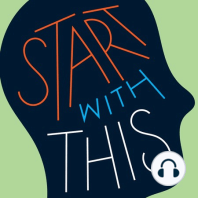3 min listen
Dialogue
FromStart With This
ratings:
Length:
34 minutes
Released:
Jun 14, 2019
Format:
Podcast episode
Description
Writing dialogue can be daunting because you can’t rely own your own narrative voice— the characters have to speak for themselves. Joseph and Jeffrey deconstruct the popular advice that every line of dialogue has to move the plot forward, to talk instead about how the best dialogue is the kind that serves your story.
Consume: Listen to Episode 1 of Steal The Stars, a podcast by Mac Rogers. Pay close attention to each line of dialogue and what it does for the story.
Create: Write a 200-word, two-character dialogue. If you’re writing for audio, the recorded piece should come out to about 2 minutes.
The first line of your piece must be, “Put the milk on the table” and the last line must be, “We are really only at the beginning.” Keep the purpose of the dialogue in mind as you write. If you’re feeling ambitious, try it again with a different reason for the dialogue.
Join the SWT Membership community to see what other listeners are making: https://www.patreon.com/startwiththis
Help spread the word about the show by wearing our logo on your torso:
https://topatoco.com/collections/startwiththis
Follow us on Facebook and Twitter.
Credits: Jeffrey Cranor (host) & Joseph Fink (host), Julia Melfi (producer), Grant Stewart (editor), Vincent Cacchione (mixer). Rob Wilson (logo). Produced by Night Vale Presents.
http://www.startwiththispodcast.com
http://www.nightvalepresents.com
Consume: Listen to Episode 1 of Steal The Stars, a podcast by Mac Rogers. Pay close attention to each line of dialogue and what it does for the story.
Create: Write a 200-word, two-character dialogue. If you’re writing for audio, the recorded piece should come out to about 2 minutes.
The first line of your piece must be, “Put the milk on the table” and the last line must be, “We are really only at the beginning.” Keep the purpose of the dialogue in mind as you write. If you’re feeling ambitious, try it again with a different reason for the dialogue.
Join the SWT Membership community to see what other listeners are making: https://www.patreon.com/startwiththis
Help spread the word about the show by wearing our logo on your torso:
https://topatoco.com/collections/startwiththis
Follow us on Facebook and Twitter.
Credits: Jeffrey Cranor (host) & Joseph Fink (host), Julia Melfi (producer), Grant Stewart (editor), Vincent Cacchione (mixer). Rob Wilson (logo). Produced by Night Vale Presents.
http://www.startwiththispodcast.com
http://www.nightvalepresents.com
Released:
Jun 14, 2019
Format:
Podcast episode
Titles in the series (62)
Start With This: Trailer: Normally, creators of Welcome to Night Vale Jeffrey Cranor and Joseph Fink are the ones turning their ideas into stories. But for this podcast, it’s you who will do the writing, one short and simple assignment at a time. by Start With This
